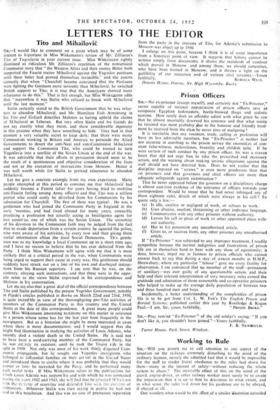LETTERS TO THE EDITOR
Tito and Mihailovk
SIR,—I would like to comment on a point which may be of some interest to historians in Miss Wiskemann's review of Mr. Zilliacus's Tito of Yugoslavia in your current issue. Miss Wiskemann rightly dismissed as ridiculous Mr. Zilliacus's repetition of the nonsensical Communist story that " the Western Allies and their enemy Hitler both supported the Fascist traitor Mihailovie against the Yugoslav partisans until these latter had proved themselves invincible," and she asserts correctly that when " Churchill became convinced that the Partisans were fighting the Germans more seriously than Mihailovie, he switched British support to Tito; it is true that the Americans showed more reluctance to do this." That is fair enough, but Miss Wiskeaaann adds that " meanwhile it was Stalin who refused to break with Mihailovie until" the last moment."
Stalin certainly stated to the British Government that he was reluc- tant to abandon Mihailovie, and Mr. Hamilton Fish Armstrong in his Tito and Goliath describes Molotov as hairing upheld the claims of Mihailovid at Teheran. But very often Stalin and his friends do not say exactly what they mean, and show considerable ingenuity in this pastime when they have something to hide. They had at that moment a very valuable secret to keep dark: that there were many Communists working in Britain and America to persuade the Allied Governments to desert the anti-Nazi and anti-Communist Mihailovie and support the Communist Tito, who could be trusted to turn Yugoslavia into a satellite of the Soviet Union at the end of the war. It was advisable that their efforts at persuasion should seem to be the result of a spontaneous and objective consideration of the facts and not as the execution of instructions from Moscow. Hence it was well worth while for Stalin to pretend reluctance to abandon Mihailovie.
Let me give a concrete example from my own experience. Many people attempted at this period to convince me that Mihailovie had suddenly become a Fascist (after for years having tried to mobilise anti-Fascist feeling among Army officers) and that Tito was a selfless patriot who could easily be detached from his Communism by his admiration for Churchill. The first of these was typical. He was a gentleman who had joined the Communist Party in England in the early 'twenties, and had lived abroad for many years, ostensibly practising a profession but actually acting as Intelligence agent for two countries, one of which was the Soviet Union. The extremity of his devotion to the Communist faith may be judged from the fact that to evade deportation from a certain country he squared the police, who were aware of his activities, by every now and then giving them useful information about the local Social Democrats. This gentle- man was to my knowledge a loyal Communist up to a short time ago, and I have no reason to believe that he has ever defected from the Party. I think Miss Wiskemann will agree with me that it is most unlikely that at a critical period in the war, when Communists were being urged to support their cause in every way, this gentleman should suddenly have struck out on a line of his own and disobeyed instruc- tions from his Russian superiors. I am sure that he was, on the contrary, obeying such instructions, and that these were in the oppo- site sense to the views Stalin expressed in his correspondence and Molotov in his conversation.
Let me say also that a great deal of the official correspondence between Tito and Stalin published by the present Yugoslav Government, notably in Pijade's articles published in Borba on March 22nd and 23rd, 1950, is quite incredible, in view of the thoroughgoing pro-Tito activities of members of the Communist Party in this country and the\United States at the date of this correspondence. A great many people' could give Miss Wiskemann interesting testimony on this matter in reference to a person whose name has for the last year been frequently in the newspapers. But as a historian she might be more interested in cases where there is more documentation; and I would suggest that she might find illumination in studying the activities of Louis Adamic, who recently died a violent death in the United States. • He is said not to have been a card-carrying member of the Communist Party, but he was entirely its creature, until he took the Titoist &de in the split in 1950. Not only was most of his work thinly disguised Com- munist propaganda, but he sought out Yugoslav immigrants who belonged to influential families on their arrival in the Uni.ed States and introduced them to circles where it was probable that they would sooner or later be recruited for the Party; and he performed many such useful tasks. If Miss Wiskemann refers to the publications for which Lows Adamic was respon&b!e and with which he was connected during the years 1942 and 1943. she will find that he attacked Mirail.wie with the evrertie of scurrility and defended Tito wi.h the extrzrre of enthusiasm-. Whatever Stalin was then saying in public he had not said to this henchman. And _this was no case of premature separation
from .the party in the interests of Tito, for Addmic's submission to Moscow was abject up to 1950.
I enlarge on this point, because I think it is of some importance from a historical point of view. It suggests that history cannot be written simply from documents; it shows the standards of candour which prevail in Moscow and among those, we should remember, who have been trained in Moscow; and it throws a light on the gullibility of our statesmen and of various civil servants.—Yours


































 Previous page
Previous page